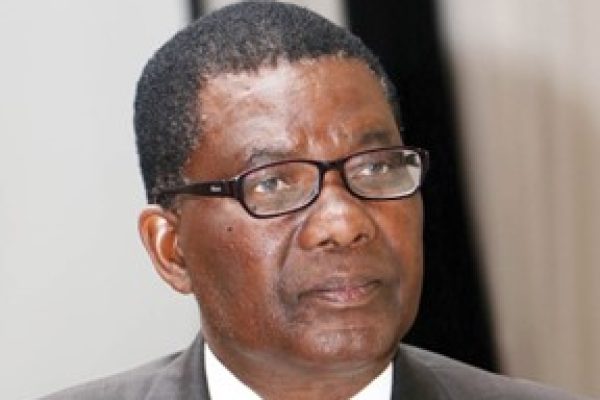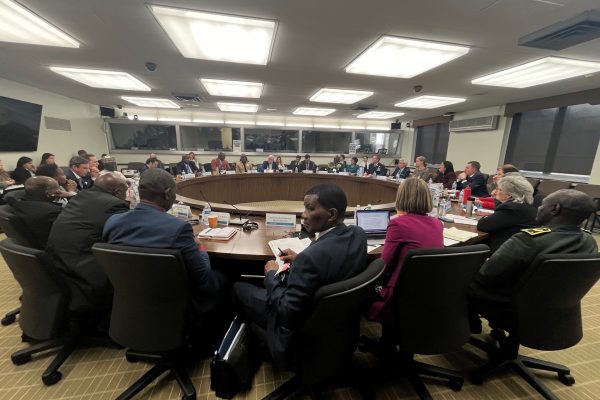English | Français | Português
 His Excellency Ambassador Professor Mpho G. Molomo is the current Special Representative of the Chair of the Southern African Development Community (SADC) Organ on Politics, Defense and Security Cooperation and Head of the SADC Mission in Mozambique (SRCO/SAMIM).
His Excellency Ambassador Professor Mpho G. Molomo is the current Special Representative of the Chair of the Southern African Development Community (SADC) Organ on Politics, Defense and Security Cooperation and Head of the SADC Mission in Mozambique (SRCO/SAMIM).
Professor Molomo underscored the fact that SADC is one of the African Union (AU) Regional Economic Communities (RECs) contributing to the African Peace and Security Architecture (APSA) under which SAMIM was launched in July 2021 hence operationalizing the African Standby Force (ASF) guidelines. SAMIM is an African Union endorsed mission operating under the AU Compliance and Accountability Framework (CAF) in conformity with internationally accepted norms enshrined in the United Nations Charter that, among others, include respect for International Human Rights Law (IHRL) and International Humanitarian Law (IHL).
Professor Molomo noted with great optimism that the adoption of United Nations Security Council Resolution 2719 in December 2023 unlocks a huge potential for supporting AU-led Peace Support Operations (PSOs). He argued that given the current geo-political realities, conflicts have largely tended to be intra- state as opposed to being inter-state hence requiring enhanced localized solutions. In this regard, RECs being on the front-line of conflicts are better positioned to respond and address them. Professor Molomo further emphasized the strategic imperative for a peaceful and stable Mozambique for regional peace and stability of SADC. In addition, peace and stability in Mozambique, he argued, is crucial given the fragile environment in the Red Sea region and the strategic need for an alternative trading route around the Southern tip of Africa. In this regard, Mozambique, and in particular the Mozambique Channel, is of immense strategic value to global trade and security.
Professor Molomo further highlighted that the SADC Mission in Mozambique is one of the viable models that must be supported to address regional conflicts. However, he hastened to point out that SAMIM and other regional PSOs are facing a huge deficit in required capabilities including: strategic airlift of equipment and personnel; other logistical support; and financial resources in order to effectively execute their mandates. SAMIM is funded by SADC member states and Troop Contributing Countries (TCCs) using their own equipment and resources for sustainability since Mission inception in 2021. This is a practical demonstration of community solidarity and cohesion focused on the attainment of regional peace and security and in line with AU ideals. There is, however, need to augment and adopt sustainable financing models in line with recommendations of the UN Security Council Resolution 2719 of 2023.
Professor Molomo is a long-standing Alumnus of the Africa Center for Strategic Studies (Africa Center) and has actively participated in its activities and programs. Professor Molomo first participated in an Africa Center programs by attending a course on Regional Security Cooperation in September 2002 in Maputo, Mozambique. Subsequently, he attended several Africa Center programs including the 2004 Senior Leaders Seminar in Washington, DC, a high-level two-week gathering designed to bring together African leaders and international partners to reflect collectively on key security challenges facing Africa.
Professor Molomo acknowledged the Africa Center as a strategic actor and an important forum that provides a platform for academicians and policy makers to better understand the global security landscape and measures to resolve conflicts. In particular, it is a forum that seeks to inform the United States foreign policy on Africa’s security needs and challenges. It further fosters cooperation and partnerships between African governments and the United States.
 Professor Molomo appreciated the invitation by the Africa Center to participate in the January 2024 roundtable discussion on “Comparative Advantage, Coordination and Convergence in African Peace Operations” and speak on “The Challenges and Opportunities of Regional Economic Communities (REC)-Led Peace Operations.” Professor Molomo shared with the Force Commanders’ Roundtable the SAMIM Mandate and its engagement and support rendered to the Republic of Mozambique to combat acts of violent extremism and terrorism in the Cabo Delgado Province. Professor Molomo pointed out that since the deployment of the Mission in July 2021, they have in support of the Republic of Mozambique Forces dislodged Ahlu Sunnah Wa Jamaah (ASWJ) terrorists from the cities, towns and villages and continue to deny them freedom of movement in SAMIM’s area of responsibility. Professor Molomo further pointed out that the initial deployment at the inception of the mission entailed robust offensive military capabilities followed by a transition into a multidimensional mission with enhanced police, corrections, and civilian capacities over and above the military capability. The Mission has managed to usher in relative peace and stability allowing for a progressive return of internally displaced persons and supporting stabilization and recovery efforts by the Republic of Mozambique in Cabo Delgado Province.
Professor Molomo appreciated the invitation by the Africa Center to participate in the January 2024 roundtable discussion on “Comparative Advantage, Coordination and Convergence in African Peace Operations” and speak on “The Challenges and Opportunities of Regional Economic Communities (REC)-Led Peace Operations.” Professor Molomo shared with the Force Commanders’ Roundtable the SAMIM Mandate and its engagement and support rendered to the Republic of Mozambique to combat acts of violent extremism and terrorism in the Cabo Delgado Province. Professor Molomo pointed out that since the deployment of the Mission in July 2021, they have in support of the Republic of Mozambique Forces dislodged Ahlu Sunnah Wa Jamaah (ASWJ) terrorists from the cities, towns and villages and continue to deny them freedom of movement in SAMIM’s area of responsibility. Professor Molomo further pointed out that the initial deployment at the inception of the mission entailed robust offensive military capabilities followed by a transition into a multidimensional mission with enhanced police, corrections, and civilian capacities over and above the military capability. The Mission has managed to usher in relative peace and stability allowing for a progressive return of internally displaced persons and supporting stabilization and recovery efforts by the Republic of Mozambique in Cabo Delgado Province.
The SAMIM mandate recognizes that the military intervention was the first line of effort to pacify the security situation. The Mission has since transitioned to a multi-dimensional phase that addresses reconstruction, enhancing capacity of institutions to support service delivery, and rebuilding sustainable livelihoods of people. In partnership and collaboration with the host nation, development agencies, International Cooperating Partners, humanitarian agencies and civil society, the Mission is actively engaged in activities geared to bring about sustainable development to Cabo Delgado Province.
SAMIM acutely recognizes that sustainable development can come about by rehabilitating the infrastructure destroyed by the terrorists and making it functional to support service delivery and access to resources and services. Perhaps more fundamentally, sustainable development can take place when there is community security that is guaranteed by fully functioning state institutions like social services, the police, and a justice system that supports social cohesion and the social contract at various levels in society. This social contract should also entail an inclusive societal strata in terms of ethnicity, religion, gender, and where youth are progressively engaged for national development.
Professor Molomo further opined that youth are the greatest resource for Africa. This demographic dividend must be harnessed and afforded appropriate skills in digital, technology, innovation, and creative arts platforms that support the fourth industrial revolution. An empowered youth would contribute to the flagship aspiration of the AU Agenda 2063 of attaining the Africa we Want, nurtured by peace and sustainable development for all. The spirit of Ubuntu that is inherent in African culture must be revived and consolidated to afford Africa’s actualization and self-fulfillment.
In line with the African virtue of Ubuntu/Botho (compassion), youth should be empowered to contribute positively to socio-economic development to build sustainable peace and security. They should be engaged and nurtured into building a peaceful co-existence and holistic future based on kindness and compassion and anchored on core values of Ubuntu.

